Ranking The Best Trolling Motors On The Market
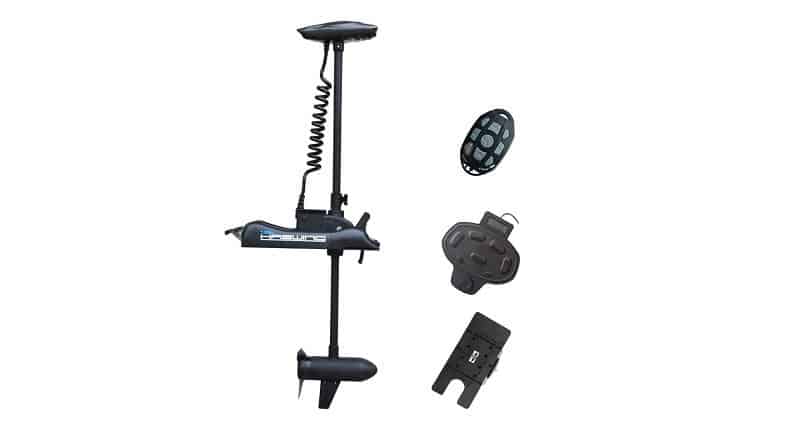
Black Haswing 12V Bow Mount Trolling Motor
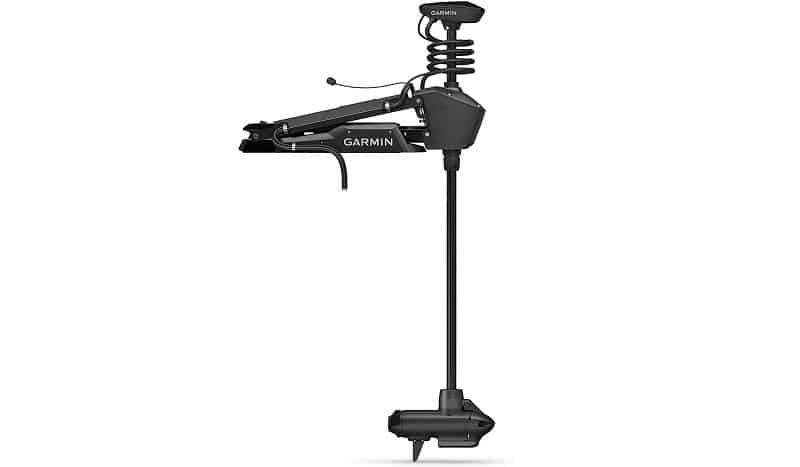
Garmin Force Foot Steer Trolling Motor
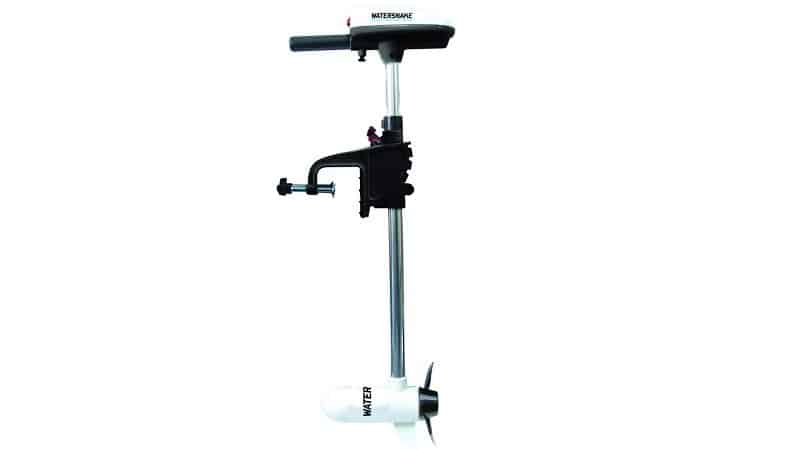
Watersnake ASP Salt Water Transom Mount Trolling Motor
A trolling motor is an indispensable piece of equipment for anglers of all stripes. They’re the perfect tool for gently moving from one point to another in a precise and controlled manner, without disturbing the water and scaring away the fish.
If you’re not familiar with the purpose of a trolling motor, they are small and compact self-contained electric motors that can be mounted to the bow or stern of a boat. They’re not designed to provide outrageous thrust and performance, but just enough propulsion to move a boat through the water in a quiet and discreet manner that won’t worry the wildlife.
But which one do you need?
There are so many different products on the market that you’re literally spoilt for choice. However, making the wrong decision could make or break a fishing trip. A motor that runs too loudly will leave your keep nets empty. A motor without enough thrust will leave you stranded at the dock. The wrong shaft length will see you catching a whole load of spray and not a lot of fish.
Different vessels require different motors, with different mounts and different properties. No online guide is going to magically pick out the best trolling motor for your needs, but we’re hoping to point you in the right direction so that you can find the best motor for your boat. Here are our top choices.
Minn Kota Endura C2 55 Transom Mount Trolling Motor
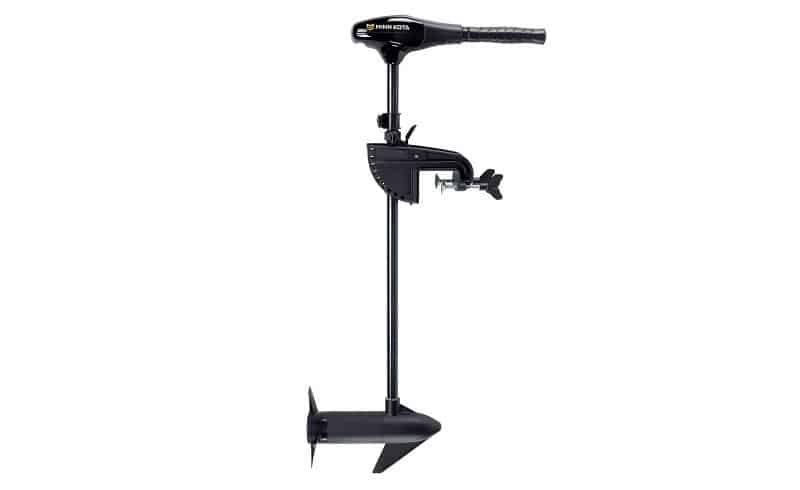
This stealthy motor from Minn Kota is one of the best trolling motors in the business. The Endura C2 series is ideal for those looking for adequate power that’s delivered in a discreet and quiet manner. While it’s available with different thrust levels, we think a thrust level of 55 is a great choice for a wide variety of freshwater boaters.
Take note of the freshwater designation, because this 12-volt transom-mounted motor is for freshwater only. It features a 36-inch long shaft, a power prop for a little extra power when you’re pushing through obstacles, with a practical and easy to operate telescopic handle and tiller.
The tilt-twist tiller offers easy speed control and steering, with 5 forward speeds and 3 reverse speeds on offer.
It scores high on the energy-efficiency chart too, with some boaters recording up to 8 hours of constant use before their battery began to die. Cool quiet power is the buzzword for this product.
Lastly, there’s the mount. This Minn Kota trolling motor has an easy to use mount which can be attached in a number of different positions for easy installation. It also features a lift and rotate level lock bracket, making for easy backtrolling at a moment’s notice.
Pros
- 12-Volt freshwater trolling motor available with multiple thrust ratings
- Tough composite shaft which won’t rust or corrode
- Equipped with a Weedless Wedge 2 power prop
- Very quiet and energy efficient
Newport Vessels L-Series Transom Mount Electric Trolling Motor For Saltwater
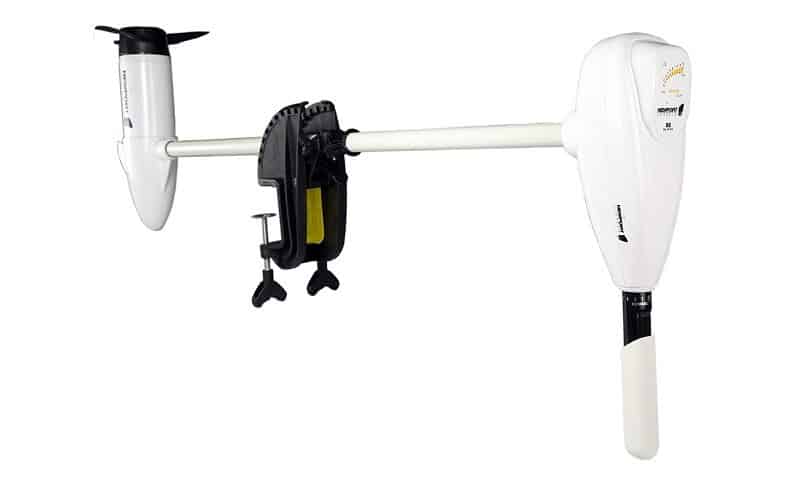
Newport Vessels is a brand name that you can really trust when it comes to marine equipment. This particular trolling motor is a great choice for those looking for a top-quality motor that’s designed to handle saltwater. It has a big price tag, but it’s made with high-grade materials and components, and since it’s designed for use in the ocean, the extra expense buys you much needed peace of mind.
It’s available in two thrust outputs, 62 lbs and 86 lbs, both suited for different conditions. The largest size is a rather high-powered motor that offers big performance in a quiet package, allowing you to stealthily move through the water, even against strong currents and high winds.
Both sizes feature a 40 inch fiberglass composite shaft that’s almost unbreakable and totally rust and corrosion resistant. The shaft and prop are operated by a telescopic handled tiller which provides confident steering and ultimate control. 8 speeds are available to choose from, with 5 forward speeds, and 3 reverse.
One of the nicest features about this trolling motor is the battery meter. 10 LEDs measure your battery level, indicating how much power you have left, ensuring that you won’t be left drifting without power in the ocean. Two 12 volt cycle batteries are required to power this motor, or a 24 volt trolling motor marine battery.
Finally, Newport Vessels proudly assert their confidence in their products by giving each of their motors a 2 year warranty.
Pros
- Heavy duty saltwater trolling motor
- 10 point LED battery meter function
- Tough aluminum and stainless steel components
- 2 year manufacturer’s warranty
Black Haswing 12V Bow Mount Trolling Motor

Haswing USA is a company with an excellent reputation for manufacturing high-quality motors. This particular model is designed for both freshwater and saltwater activities, offers 55 lbs of thrust, and is suitable for boats weighing up to 2750 lbs. It’s quiet, compact, and energy efficient, but it also has some surprising features that make it an excellent choice for dedicated fishermen.
The most impressive feature of this small motor is the wireless remote control capabilities. A small handheld device allows you to conveniently control the motor on your boat from a distance of up to 164 ft! This means you can steer and control the power of your vessel from land, or without taking your hands off of your fishing rod.
Cruise control features allow you to have hassle free navigation while you concentrate on fishing, with easy adjustments and corrections to the speed being as simple as the push of a button. Naturally, you might have to manually adjust your heading every now and again, but that’s hardly an inconvenience.
Steering is as easy as turning a handle, and you can easily put your boat into reverse by turning the handle a full 180 degrees. The 54 inch shaft is made from stainless steel with other corrosion resistant materials, all wrapped in a compact and collapsible package that makes it easy to remove or install on another vessel in seconds.
It’s an expensive option, but for those who want a hassle-free experience, the extra money is a solid investment.
Pros
- Handheld wireless motor control
- Compatible with both freshwater and saltwater activities
- 12V motor with excellent energy efficiency
- Ships with a 2 year manufacturer’s warranty
Motorguide X3 Foot Control Trolling Motor
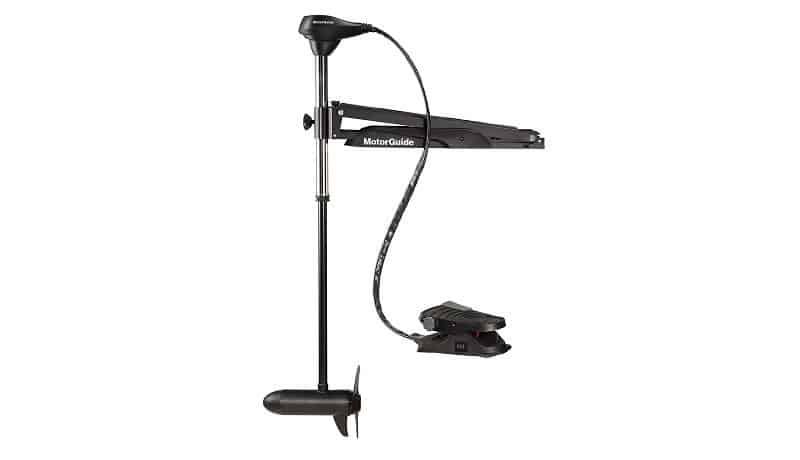
The X3 motor from Motorguide is an advanced motor which offers top performance, energy efficiency, and ultimate durability for anglers looking for the best bang for buck ratio. It’s not a cheap motor by any stretch of the imagination, but it offers great performance in return for your investment.
It’s a quite motor that will glide you across the water without scaring away the wildlife, whilst simultaneously delivering plenty of thrust, nimble steering, and a modest speed. It’s rated for 55 lb of thrust with the power delivered through 5 selectable power settings via a 45 inch composite shaft. It can be used in freshwater and saltwater, and has 180-degree steering for reverse operation.
One of the most exciting features of this motor is the foot control operation. It has a heel/toe design for maximum control, and it features a built in direction indicator. There’s also a dual cable steering system, and variable ratio steering, which makes for sharp and confident steering, and better positioning of your boat.
All of the components of this motor are high quality, with stainless steel bushings, aluminum mounts, and rust resistant fixings making it a truly exceptional motor for the price. It’s also easy to install and set up too, with easy hookup to all 12 volt power systems.
Pros
- Responsive foot-control with heel/toe operation
- 55 lbs of thrust
- Variable Ratio Steering for precision positioning
- High quality components that can be used in saltwater and freshwater
Garmin Force Foot Steer Trolling Motor

This Garmin trolling motor is one of the most sophisticated motors out there. It also has a premium price tag too. However, if you’re serious about fishing, this is the king of motors, with more special features than you’d know what to do with. This powerful trolling motor offers huge power, up to 120 lbs if it’s set up for 36 volts, making it one of the most powerful trolling motors for sale that still retains quiet operation.
As trolling motors go, this one has all of the bells and whistles. It boasts a wireless GPS chartplotter with full connectivity, allowing you to navigate with ease, put your boat on autopilot, or keep it locked in position while you concentrate on fishing. There’s also a CHIRP sonar with high-definition imagery to help you find and locate ideal fishing grounds, without the motor noise distorting the results.
It does draw more power than most though, since it operates at either 36 volts or 24 volts, depending on how long you want to fish for and what force you require. 24 volts will give you 86 lbs of thrust, while 36 volts will deliver up to 120 lbs. Using either voltage is fine, since the brushless motor is smooth and remarkably energy efficient, you can be sure that it won’t drain your batteries in seconds.
The most impressive feature of this motor is the wireless foot pedal, which feels and operates like a regular cable-steered foot control, but without the hassle of wires and with the added freedom of wireless technology. It also comes with a handheld remote control for easy point and go steering. Perfect for hassle-free navigation!
Pros
- 57 inch shaft
- Ideal for both saltwater and freshwater
- Wireless steering and motor control
- Integrated GPS and fish finder technology
Minn Kota Terrova iPilot Trolling Motor
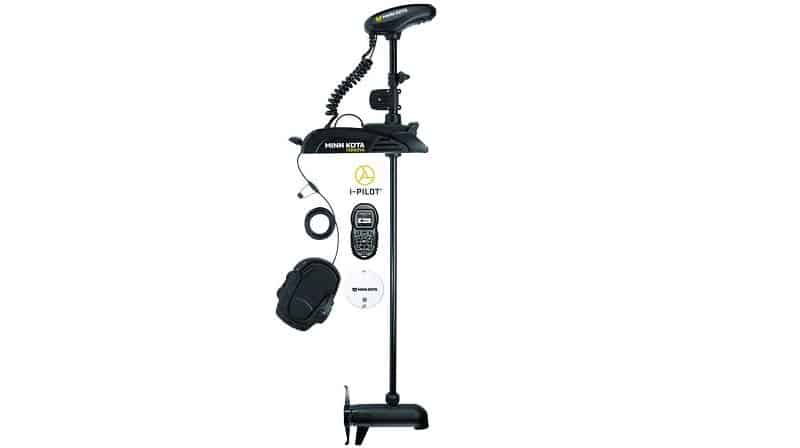
If you like the features from the Garmin model above but don’t feel like spending so much money, then the Minn Kota Terrova bow mount trolling motor is a more affordable alternative. It’s still a pricey product, since it offers top quality performance, but it sacrifices some of the finer details to make it a little more wallet friendly.
Boasting 80 lbs of thrust using a 24 volt battery, this motor comes equipped with a multi-function foot pedal with two steering options: heel/toe pedal and left/right steering buttons. It features a sophisticated easy-to-deploy ramp mechanism that gently slides the motor into the water, and it comes with a Lift-Assist function for spring-loaded stowing assistance too.
The iPilot function is one of the most interesting functions of this motor. It uses GPS to locate your favorite fishing spots, record your speed and heading, and allows for a touchscreen remote control function, with full compatibility with a Hummingbird fish finder device.
Even without the Hummingbird fish finder, it has its own fish finding technology, with a built-in Universal Sonar 2 device and a protected transducer that won’t be affected by your motor’s noise and vibration.
This is a great motor that’s primarily designed for freshwater and for bow-mounted fun, and it’s ideally suited for a number of applications. It’s available with three different shaft lengths: 45 inch, 60 inch, and 7 inch.
Pros
- Weedless Wedge 2 power prop
- Useful Spot-Lock function
- Sophisticated iPilot trolling motor
- Three shaft lengths available
GoPlus Electric Trolling Motor For Freshwater
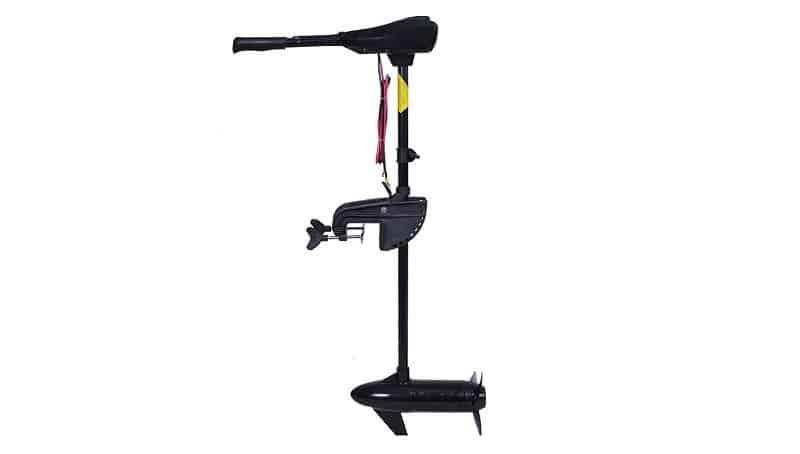
This is another budget option. It’s from GoPlus, which isn’t one of the biggest names in the industry, but the brand does make some quality budget-friendly marine equipment, so don’t discount it. It might not have the weight of a big name behind it, but it helps to keep the costs down.
GoPlus’s no-nonsense trolling motor is available in three maximum thrust outputs: 46 lbs, 55 lbs, and 86 lbs. Naturally, the bigger your vessel, the bigger thrust you’ll require but if you’re looking for a kayak or canoe trolling motor, the smallest size will do just fine. Each size features 8 selectable speeds, including 5 forward speeds and 2 reverse options.
The power is controlled via a 6” telescopic adjustable handle and tiller, which controls a fiberglass composite shaft, delivering power to a three-blade propeller. The motor features a reinforced Nylon bracket for mounting. The rest of the components are made out of durable aluminum.
A 10 point LED battery indicator allows you to keep a close eye on your power consumption, stopping you from straying too far away from the shore if your battery looks like it’s on the way out. Talking of which, this motor requires a 24 volt battery to operate.
Though it advertises itself as compatible and competent in both saltwater and freshwater, we would recommend that you mainly use this one in freshwater.
Pros
- Reinforced Nylon mounting bracket
- 8 selectable drive speeds (5 forward/3 reverse)
- 10 point LED battery level indicator
- Three thrust options for different vessel sizes
Watersnake ASP Salt Water Transom Mount Trolling Motor

While the GoPlus model above is best suited to freshwater, if you’re looking for a budget-option for saltwater trolling, then we would recommend the Watersnake APS trolling motor. It’s lightweight, easy to mount, offers enough power, and comes with a cheap price tag. It’s the perfect small boat or kayak trolling motor.
It has noticeably less power than many others on this list, but when it comes to trolling, power isn’t everything. It has enough grunt to propel you forward at a reasonable speed but not so much that it will scare away the fish. 24 lbs of thrust are on offer from this 12 volt motor.
The actual motor drives the propeller via a 24 inch shaft, with all parts and components manufactured from stainless steel, durable plastics, and coated with anti-corrosive paint, which makes it ideal for saltwater, freshwater, and brackish water applications. It boasts a low speed and high speed function, with a forward and reverse switch. The motor is controlled using the fixed tiller.
It’s lightweight, with an overall weight of just 6.7 lbs, and can easily be mounted and stowed without any hassle.
Lastly, it comes with a one year warranty that covers customers against manufacturer defects. It’s not a comprehensive warranty, but it’s quite generous considering the low price of the item.
Pros
- Low overall weight of just 6.7 lbs
- Stainless steel components
- Selectable high and low speed controls
- 1 year warranty against manufacturer defects
A Comprehensive Trolling Motor Buying Guide
Unfortunately, you can’t just buy the first trolling motor for sale. They are designed for different purposes and for different vessel-types, so you have to do a little bit of research before hitting the buy button. Here are the most important things you should keep in mind before investing in a new motor.
Where Are You Operating?
Freshwater
Freshwater trolling motors are oftentimes cheaper than their saltwater brethren. This is because freshwater isn’t particularly damaging to components. However, freshwater motors are often equipped with special propellers that can cut through weeds, which is a feature many saltwater models lack. Using a freshwater motor in the ocean is not at all recommended.
Saltwater
Saltwater motors are built to withstand the harmful effects of salt water. The high salt content in sea water can cause rust and corrosion to built up and harm your motor, particularly around the shaft. Saltwater motors are generally a little more powerful too, since they have to battle against the ocean rather than against calmer waters. Saltwater trolling motors can be used in freshwater if required.
Where Are You Mounting The Motor?
Now that you’ve worked out where you’ll be using your boat, you now need to work out where you’d mount a motor on your vessel. Some motors are designed for specific mounting locations, offering better performance mounted in one place than they would in another. Here are the different mounting areas available.
Bow
The bow—the front of the boat, for landlubbers—is a popular mounting position. These motors are often attached using a bolt-on bracket, with propellers that pull your boat through the water. Some say that bow-mounted motors offer greater control.
Transom
The transom area of your boat is the back section. Transom mounted trolling motors attach using a clamp-on bracket, and they often feature hand-operated tiller controls. This location offers easy positions and steering, in a convenient and simple package.
Engine
These motors don’t mount onto engines, but the cavitation plate that you’d usually mount and outboard or inboard motor to. The benefit of this location is that it keeps your deck clear, and the motor doesn’t have to be stowed away or deployed for use.
What Size Trolling Motor Do You Need?
One of the most confusing things about buying a new motor is working out what size motor you need. Generally, there are three important things to factor into your search: the amount of thrust your vessel requires, how many volts you need to power it, and the length of the shaft needed to provide adequate propulsion through the water. Here’s what you need to know.
Thrust
“Thrust” is the word used to describe how much power a motor has. In the US, we measure thrust in pounds. Naturally, the heavier your boat is, the more thrust you’ll need to help it move through the water.
It’s generally accepted that you require at least 2 lbs of thrust per 100 lbs of overall weight. We say “overall” because that figure should also include your gear and passengers’ weight too, and not just your boat’s weight.
More thrust is better, since it can help you in trickier conditions with strong winds and currents, but more thrust often causes bigger disturbances in the water, which could frighten away fish.
Voltage
Next, there’s the voltage. Unsurprisingly, voltage is always measured in volts. The voltage indicates how much electrical power a motor will require. A 12 volt motor will require a 12 volt battery. A 24 volt motor will demand two 12 volt batteries. In short, you’ll need one battery for every 12 volts that a motor demands.
Generally speaking, motors providing under 55 lbs of thrust will require a single 12 volt battery. From 60 lbs to 80 lbs, 24 volts, using two 12 volt batteries will be required. Thrust greater than 100 lbs will usually require 36 volts, using three 12 volt batteries. But always follow the manufacturer’s advice for the best results.
Shaft Length
Lastly, another crucial motor feature to take into account is the shaft length. The wrong shaft length won’t do you any favors. If a shaft is too short, the propeller won’t be submerged enough to provide propulsion. If a shaft is too long for the waters you’re exploring, it could hit the bottom and damage the propeller.
Different mounting locations require different shaft lengths; however, it’s recommended that the actual motor section (with the propeller) sits at least 12 inches below the waterline. Fortunately, there are plenty of guidelines out there about determining the proper shaft length.
Operation Type
After you’ve worked out what type of motor, mount, and power you require, then the fun can really begin. Now you can start looking at the details. One aspect that many boaters really like to take their time to consider is the operation types available. Do you want a good old-fashioned hand tiller? A hands-free foot pedal? Or something really modern, with wireless remote control?
Hand Steer
Steering with a hand operated tiller is the most traditional method of steering a boat and controlling a motor. Most tiller controls feature a telescopic handle for easy, precise steering with excellent maneuverability. They do require yours hands though, which can be a pain if you prefer to keep your hands on your fishing rod at all times!
Cable Steer
Cable-operated devices are mostly governed by a foot pedal. These pedals control cables that deliver instructions to the motor. They generally feature heel/toe operation for controlling forward power, most also have left and right steering capabilities too. Foot pedal cable steering devices are great for those who like a hands-free experience.
Electric Steer
At the more expensive end of the scale you can find electronically controlled steering options. The most basic of these have wireless remote control steering, often via a touchscreen or handheld device. More advanced options use GPS technology and other compatible devices to utilize autopilot systems that use satellite technology to take you to your destination, or hold you in place over your favorite fishing spots.
These options are generally more expensive though.
Advanced Features
Like the electronic steering, trolling motors can be incredibly technologically advanced. For those who really want to have the best of the best, here are some top-level advanced features that are on offer.
GPS
Marine GPS devices are indispensable to serious boaters. They’re not necessary for the casual kayaker’s trip up and down the river, but if you’re heading out into deeper water, or out into the ocean, having some kind of GPS feature is a wise idea. GPS devices can help you locate your favorite fishing spots easily, and point you in the right direction if you get lost. Some can even contact help in an emergency too.
Autopilot
Autopilot and cruise control options are quite useful if you’re planning on a longer journey. Not having to keep all of your attention on steering and controlling the power leaves you free to do other things, such as get your gear in order, keep an eye on the conditions, or just relax while you’re on the water. Many devices also have Spot-Lock features, which keeps your vessel locked in place, using the motor to reposition the vessel if the current tries to pull your boat away.
Fish Finder Sonar
Fish finders are very similar to GPS devices, but they also have the advantage of underwater sonar. Using transducer attachments, these devices can send multiple sonar pulses through the water, detecting fish and underwater topography, giving you a crystal-clear indication of what’s underneath your hull. Fish finders are must-have devices for fishermen.
Connectivity & Compatibility
While some motors have Wifi connectivity, we mainly mean connectivity in the sense that it’s a motor that can connect with other marine-based devices. Some brands, such as Garmin, offer full compatibility with most of their product range. So, it would be possible to connect a trolling motor with a fish finder, for example. Some motors connect with GPS devices, and others can connect with some phone apps. If technology and connectivity is your thing, these features are worth looking out for.
Other Things To Consider
Stowage & Deployment
Since trolling motors need to be deployed, it’s worth looking at how easy it is to get them into the water. Some have spring-loaded features to make deployment easy, as well as making the motor a breeze to pull up and stow. Many modern motors even have power-assisted functions and pedal-operation to do the job for you. It’s not of massive importance, but it’s a good idea to keep this in mind.
Portability
If you have multiple boats, or like to use a kayak in a certain lake, another canoe in your favorite river, and like to use a pontoon boat for coastal fishing, then you might be better off buying one trolling motor that you can use for all three. Look out for compact motors that are easy to transport—this could save you a lot of money in the long run!
Parts Supply
Making sure that there’s an easily accessible supply of spare parts for your motor is another important thing to take into account. Larger, reputable brands often sell higher priced items, but they also usually have excellent customer service with access to a huge parts network. Unknown brands can sell quality devices for cheaper, but if something goes wrong or a part needs replacing, you might be left with few practical options.
Throwing away a perfectly good motor because you can’t find a replacement propeller would be a real shame, and a real waste of money too. Always read the reviews and comments sections online for existing customer’s experiences of a brands parts supply and customer service.
In Summary: What’s The Best Trolling Motor?
There’s no one-size-fits-all trolling motor that will please everyone. What works perfectly for one kind of fisherman using a certain type of boat will be completely wrong for another. But as long as you follow our buying guide, read other reviews, and do your research, then you’re sure to find the perfect fit for your needs. However, if you need a bit more inspiration, there are a few stand-out products that we feel like we need to highlight. Here’s our best of the best:
The best trolling motor for boaters on a budget would be the Watersnake ASP Salt Water Transom Mount trolling motor. It’s ideal for a wide range of activities and boat types, and it has a very low price tag. It’s light, easy to transport, and simple to install. Though it lacks in advanced features, it’s great for hassle-free trolling, and it even comes with a one year warranty. Perfect for trolling on a budget.
At the other end of the scale, we’d have to choose the Garmin Force Foot Steer motor as out premium pick. It’s pricey, but you get a lot for your money. Not only do you get a very powerful but quiet and discreet motor, you also get a whole suite of advanced Garmin electronics, including GPS, a fish finder, and remote control capabilities. It’s expensive, but it’s a serious piece of equipment.
Lastly, if we had to pick our favorite, a best trolling motor overall, then we’d choose the Black Haswing 12V Bow Mount trolling motor. It’s a small and compact 12 volt motor that produces up to 55 lbs of thrust. It features a range of exciting features, including wireless control, cruise control, saltwater and freshwater compatibility, and a 2 year manufacturer’s warranty. The price is very reasonable too—it’s not a budget product, but it’s not overpriced either. It’s our favorite product overall.
Categories: Reviews
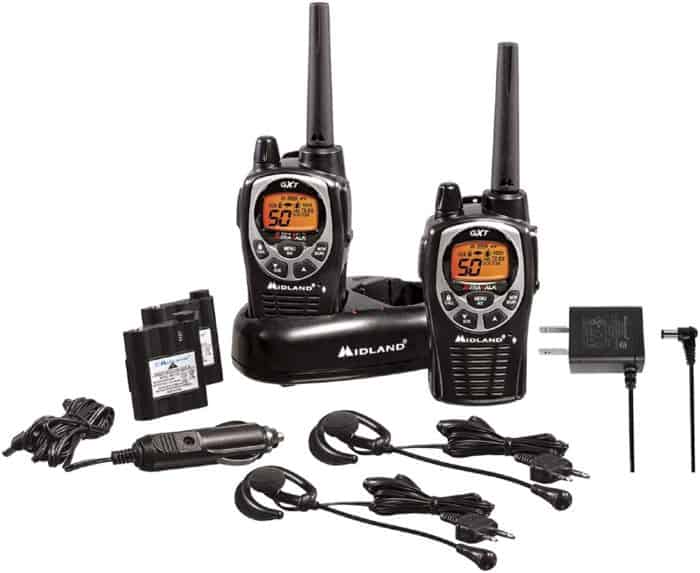


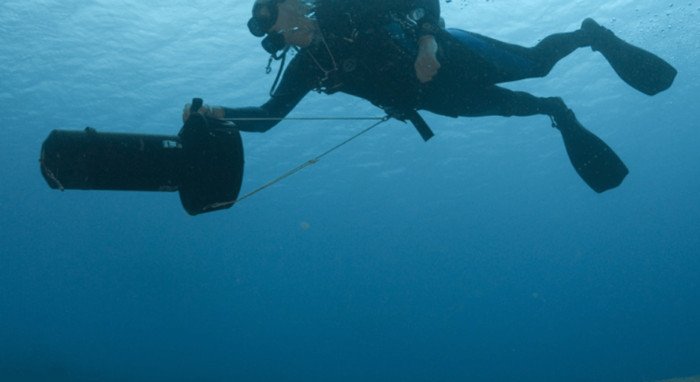




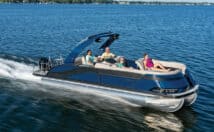
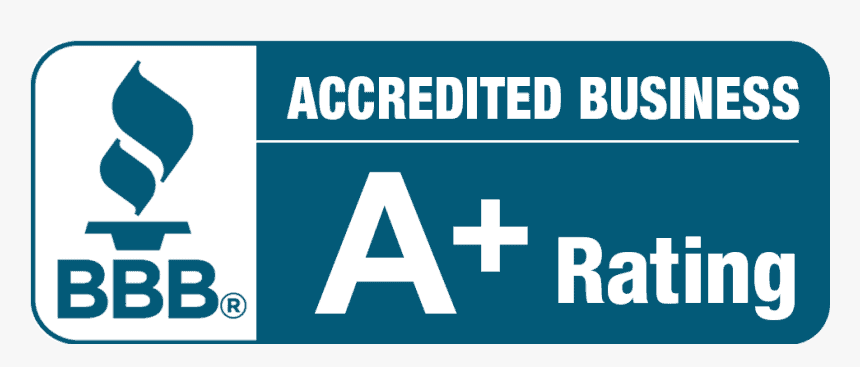


4 Comments
Doug Prebble on August 24, 2021
Thanks Joe but if you actually spend a summer running a Motor Guide, you would probably write a different report. I have the Motorguide X3 Foot Control Trolling Motor.I bought it because many years ago I had one on my bassboat as a tournament fisherman. It was bulletproof, never gave us a problem over a thousand hours of use. So I bought a new one -70 lb thrust 24V. It’s nowhere near as powerful as my old 50 lb thrust on a heavier boat. With less than 30 hours of use the foot pedal mechanism broke. I’m still waiting for a part after I ordered June 28. The press-fit washer holds the tracking wheels for the wire. Blew off. I ended up tapping one of them and putting a lock-nut on it so I could use it. The other wheel I drilled the shaft and put a cotter-pin through it to stop it from popping out. Today after about recreational summer’s use, the rope to pull it up out of the water broke. This motor is made as cheaply as it could possibly be made. It pale’s in comparison to the earlier product I used to use. What a sad testimony to today’s manufacturing. Thanks for listening, Doug.
Brian D Shaffer on November 7, 2021
Welcome to my world. I bought a brand new flats boat 6 months ago. It came outfitted with a Motor Guide X5. After a couple uses, the depth control collar broke. Of course it broke, it was a cheap plastic part with a molded nut retaining hex. The screw for the collar was steel, not stainless, so of course it rusted. I made a new one out of 316 stainless, that problem is solved. Next, it wouldn’t power up, I jiggled the power cord to make it work. Next, it would randomly start running while in the off position. I could be running the boat, trailering it, or just have it sitting on the trailer. Now it has 2 speeds, wide open or unplugged. It’s a wild goose chase trying to find someone to fix it. I had low expectations when I got the Motor Guide, but it didn’t even live up to my low expectations. Trash product!
Rolland Keller on November 3, 2021
Thanks Joe for your guide is a lot of help understanding trolling motors. I have a 14ft Jon boat and 16ft pontoon and a 800 acre lake. I don’t need all the bells, I need it to work now I have a better understanding what I’m looking for. Thanks Rolland
Dalton Bourne on August 29, 2022
This Minn Kota spot lock trolling motor is amazing. I have piloted a link this comes with a spot lock amazing. It comes with a remote control so that after you dock your boat in the water it will stay in place with a spot lock. You can go park your truck and trailer come back and the boat will come to you with this amazing remote